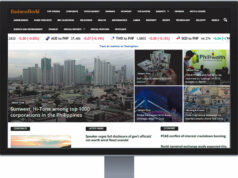How flexible and co-working spaces are boosting productivity
By Arra B. Francia, Reporter
WHEN HEAD-HUNTING and executive search firm Manila Recruitment first rented out office spaces by ASPACE in Makati City in 2013, it started out with a “plug and play” concept— incorporating designs and work stations based on their immediate needs.
Five years hence, Manila Recruitment now views the co-working office brand as a contributor to its success over the years.
“Every client that comes in says, ‘this office is really cool,’ which helps us actually make a good impression. We’ve been here for five years now, and ASPACE has been very flexible in accommodating our needs,” Manila Recruitment Co-Founder Ida Montemayor told BusinessWorld in an interview.
Manila Recruitment is just one of several businesses who use offices operated by ASPACE, a homegrown co-working brand that runs collaborative workspaces in Makati, Bonifacio Global City, and Cebu.
ASPACE, like the vast market for co-working spaces in the country nowadays, seeks to cater to the revolving need for office spaces in a work force that is increasingly being dominated by millennials.
“I wanted to support the innovation community…We built the entire concept around that. We made sure that instead of putting people in boxes, we encourage interactions. We’re actually accessing life, and they leave work feeling like it was time well spent, and that helps the company thrive,” ASPACE Founder Matthew Morrison said in an interview.
International flexible workspace operator Regus also shares this view, noting that while traditional offices are still a legitimate and viable solution, they do not “work for the employee’s satisfaction,” nor do they recognize their needs.
“That is why even for the conventional office space, they need flexible workspace solutions to complement their needs,” Regus Philippines Country Manager Lars Wittig said in a separate interview.
Mr. Wittig noted that based on studies, workstations are actually vacant for 55% of the time, on average. With this, it would be much more efficient to switch to flexible workspaces.
“It’s driven by technology, the way that we work. People want to work flexibly…the primary reason for resigning is ‘because my employer was not flexible enough.’ So there’s that speed of change and financial implications. It hammers your key performance indicators,” Mr. Wittig said.
While providing workspaces for its member-companies, flexible workspaces also help companies reduce office rental costs—which is vital especially for firms that are just starting out.
Graphic and digital design studio startup DEZYNSPACE, for instance, said it saves around 40% for office rentals, since they only need office spaces at around three times a week. Co-working spaces such as ASPACE allows them this kind of flexibility.
“As a small design agency, we don’t need to have a team together everyday…The flexibility and cost effect of what we can do with lower office rental costs is there,” the company said.
In addition, DEZYNSPACE noted that using co-working spaces has actually made it easier to retain talent, since it gives them a fun working environment.
“As a medium-sized company, we need to invest in people…you can’t save on talent, you can’t discount that, so you have to learn to manage other costs,” DEZYNSPACE said.
ASPACE’s Mr. Morrison also said that given the traffic situation in Metro Manila, it is becoming less convenient for companies to hold programs or events outside their offices.
“If you work in a place where the events are, it takes the problems away. It’s a huge benefit,” Mr. Morrison said, adding that staging events inside the office allows their members to get a break.
A study by real estate consultancy firm Colliers International tagged flexible and co-working office spaces as no longer just a disruptor in the office market, but a fundamental part of the commercial real estate market.
In 2017, Colliers found that flexible workspace take-up by operators reached 204,600 square feet across 80 locations located primarily in central business districts. The property consultancy projects 200,000 sq. ft. more to be taken up this year.
The expansion of flexible workspaces followed the take-up from traditional companies, business process outsourcing firms, and offshore gaming firms.
“Given the range of end-users in flexible workspace we expect a wide geographical spread, and operators will likely set up several smaller sites rather than fewer large scale sites due to the poor transport infrastructure. For this reason, we may see space within retail malls repositioned as flexible workspace,” according to the report prepared by Colliers Associate Director Maricris Sarino.



